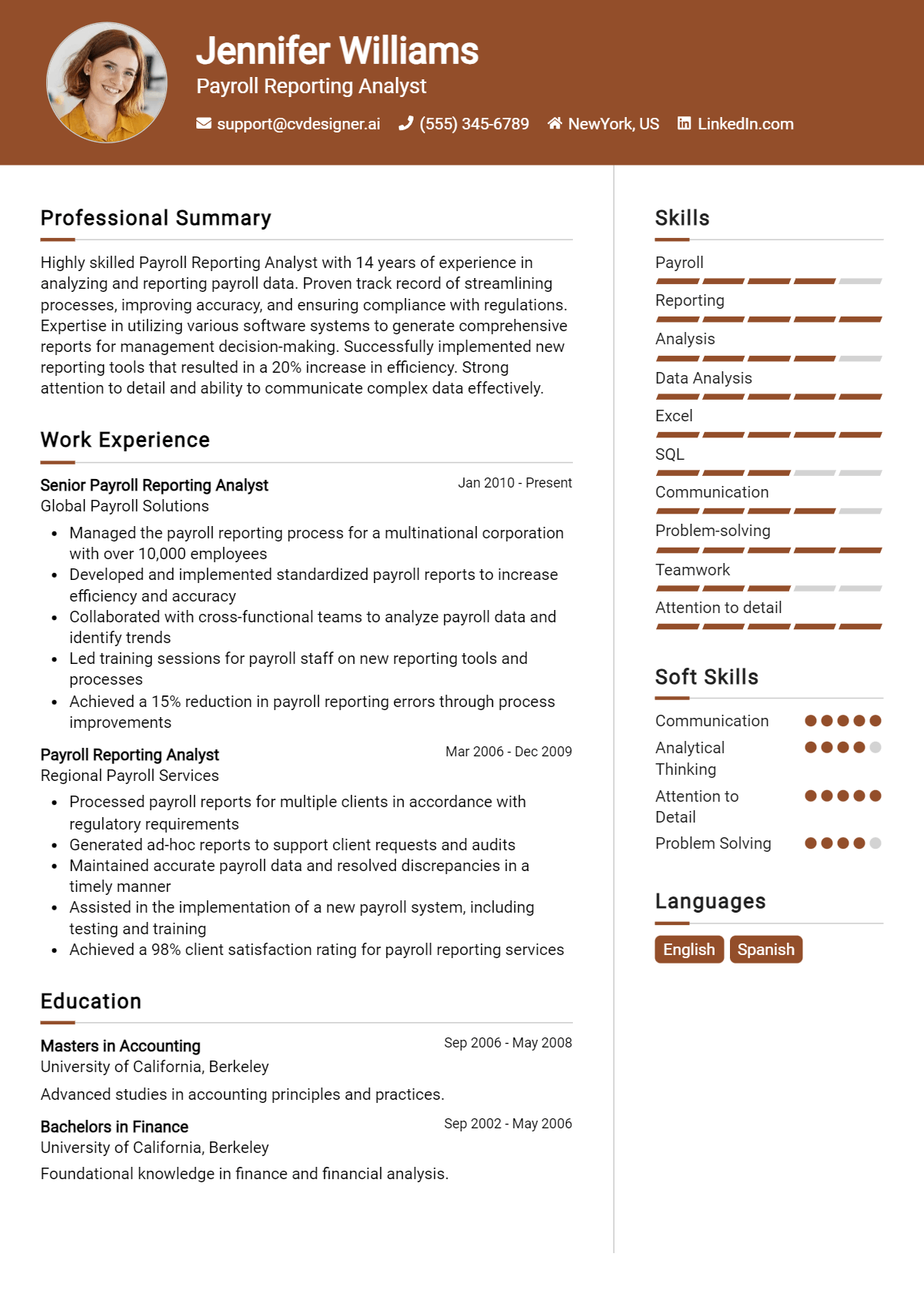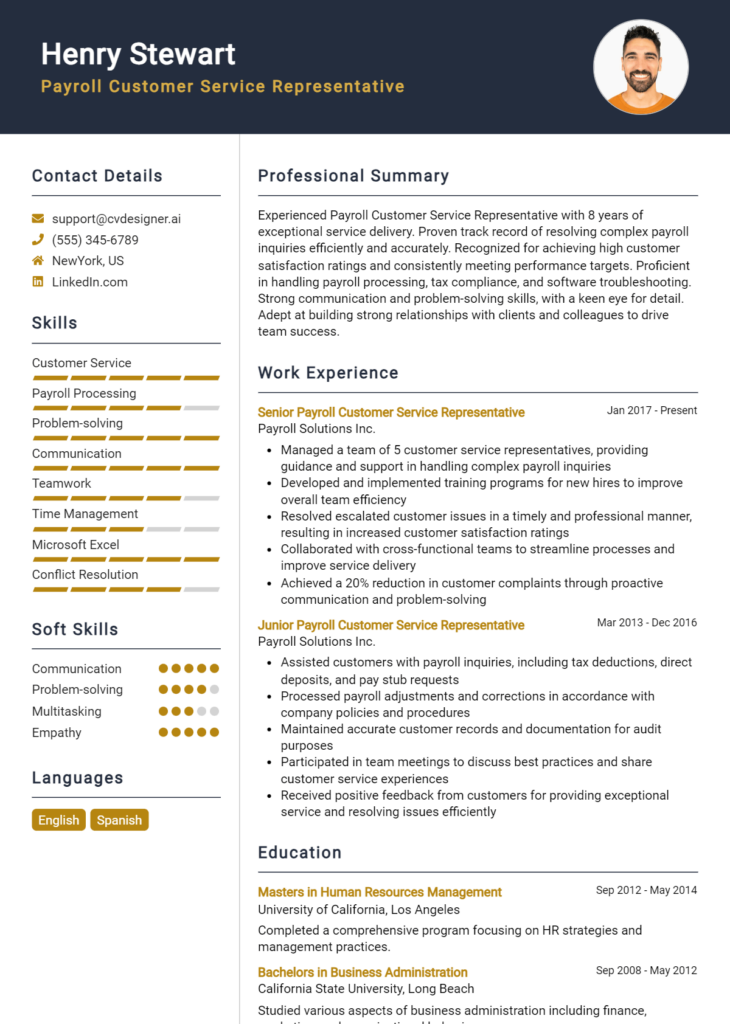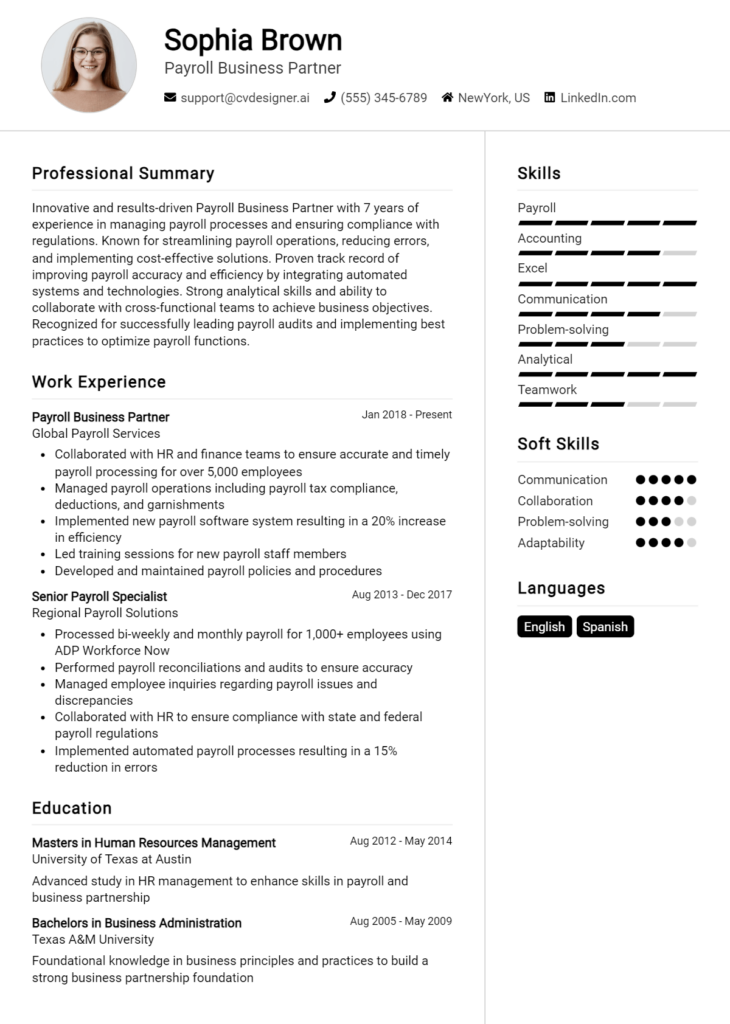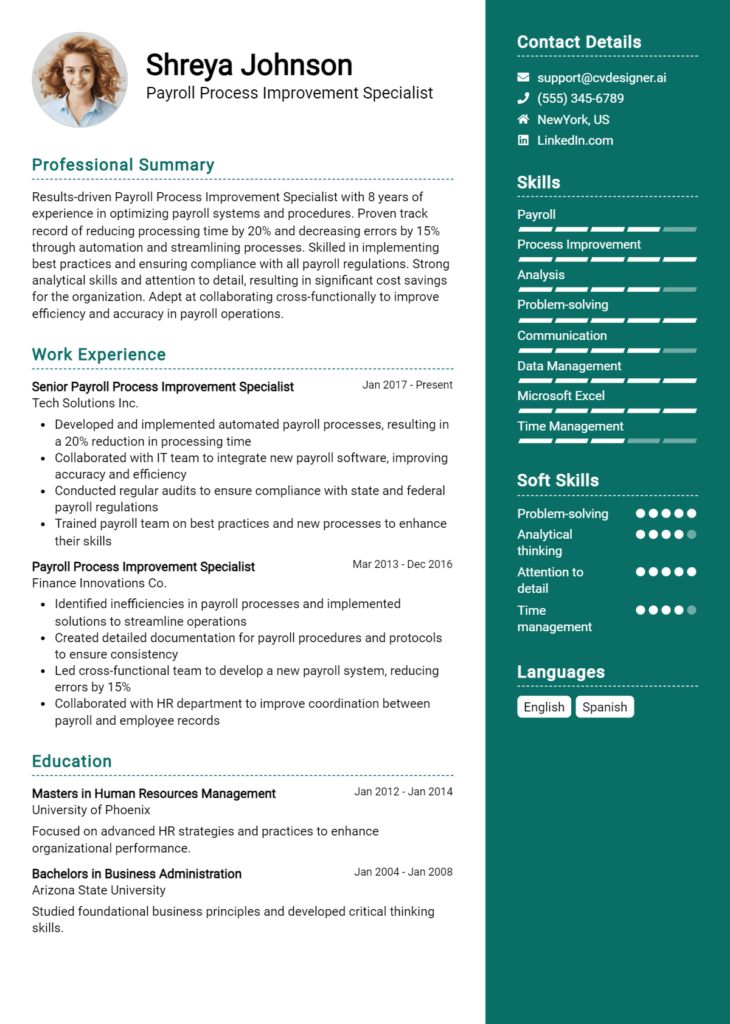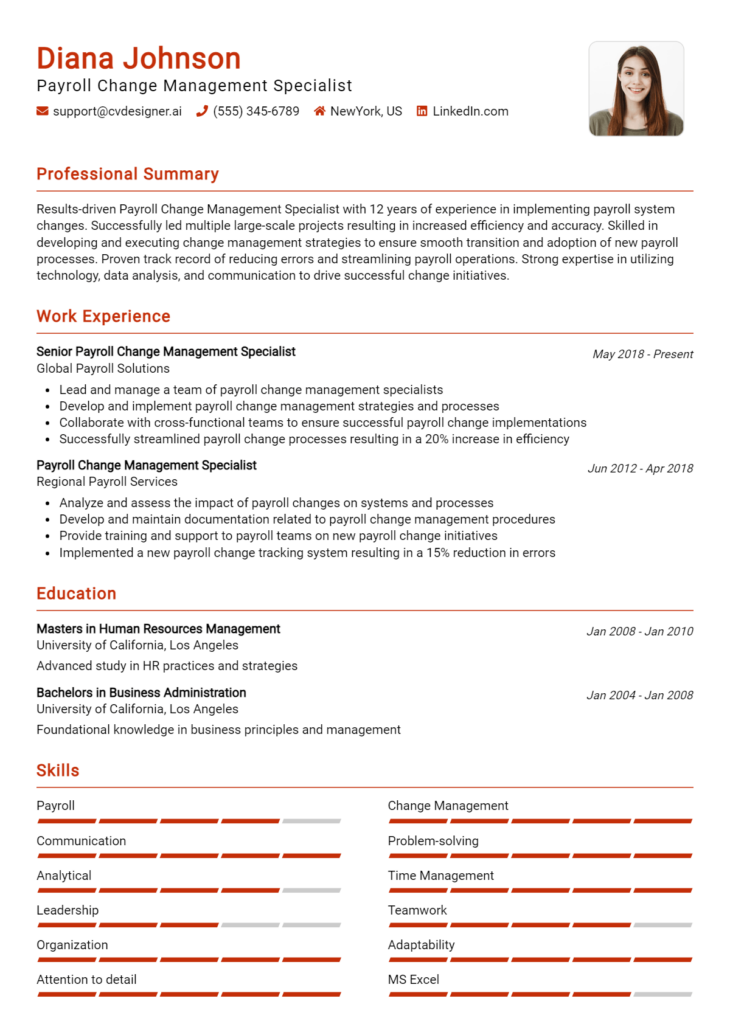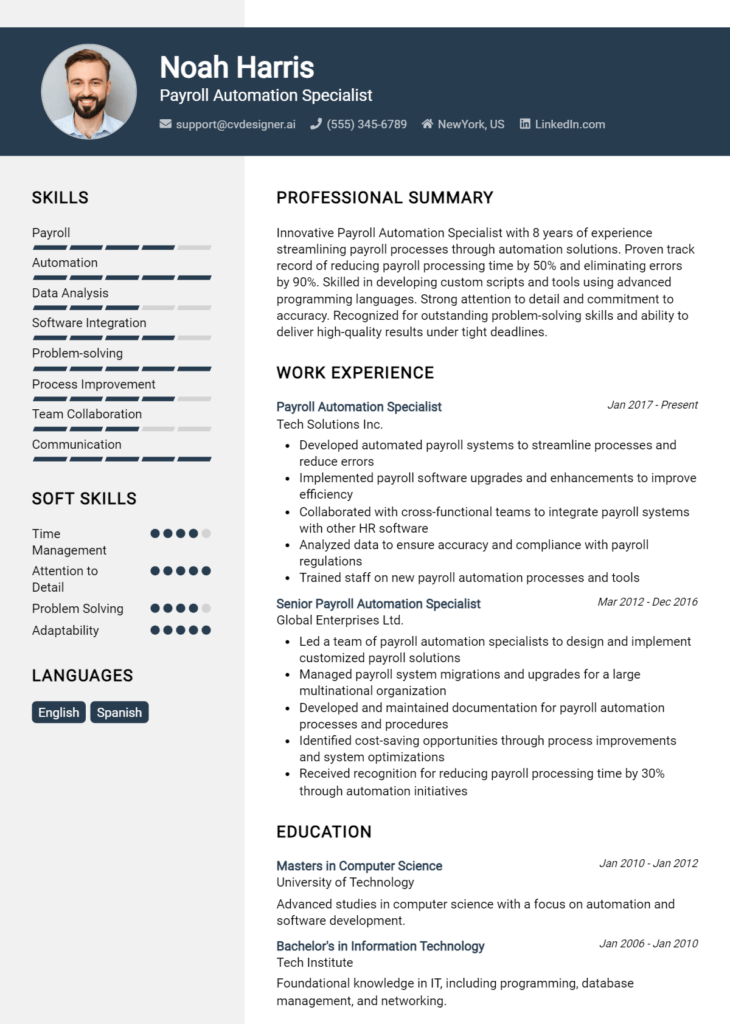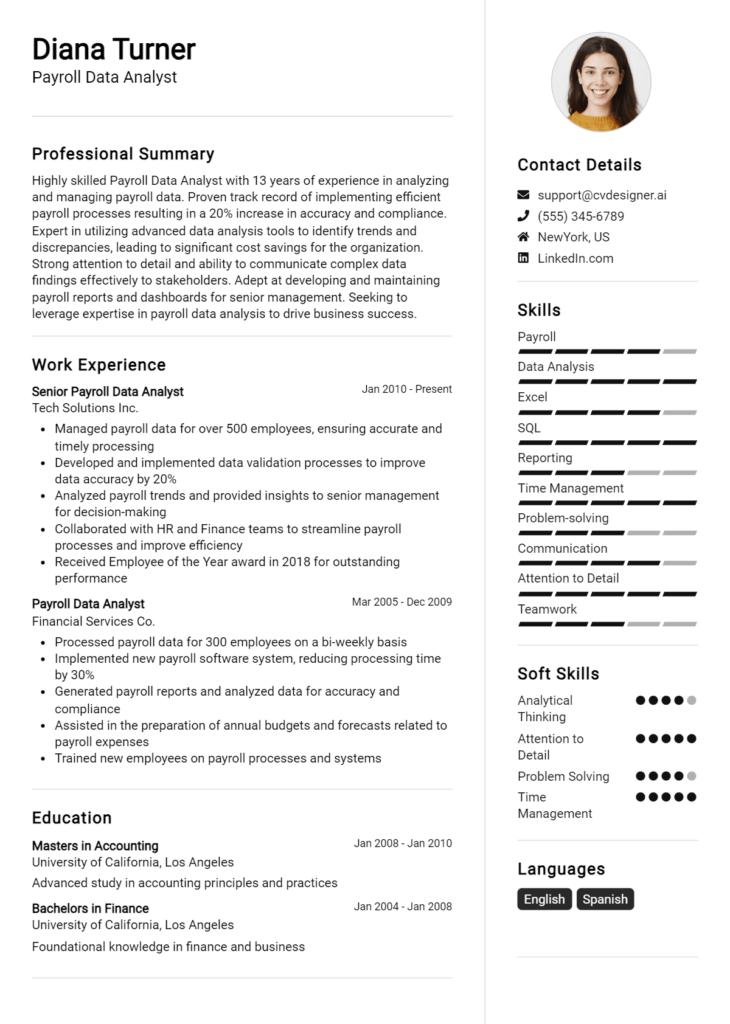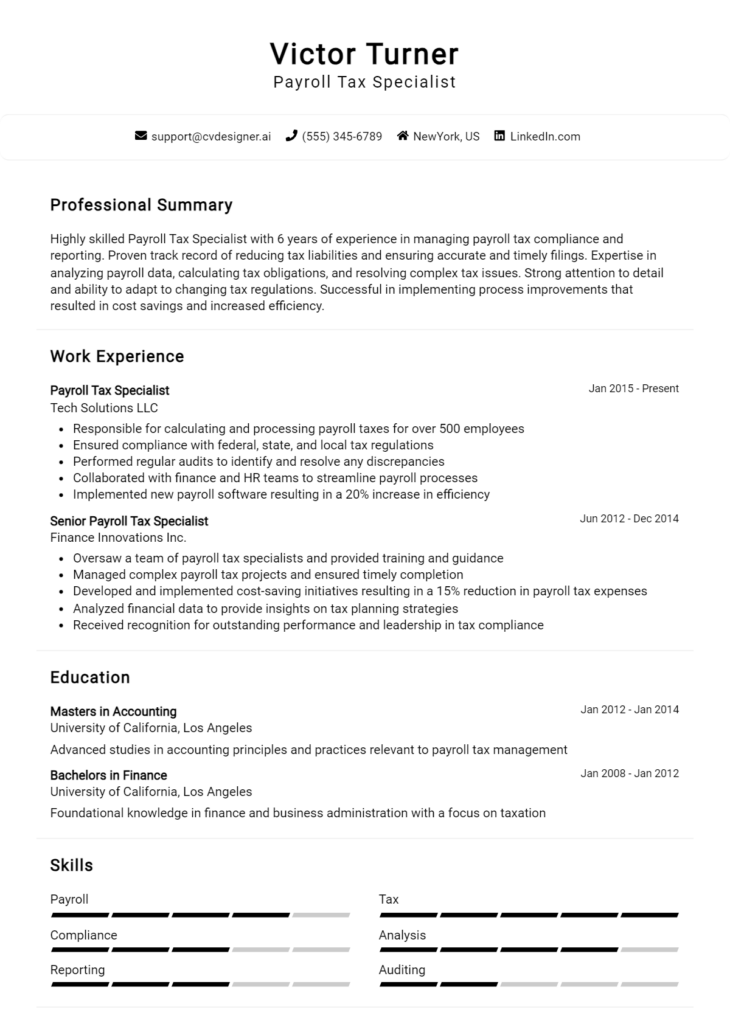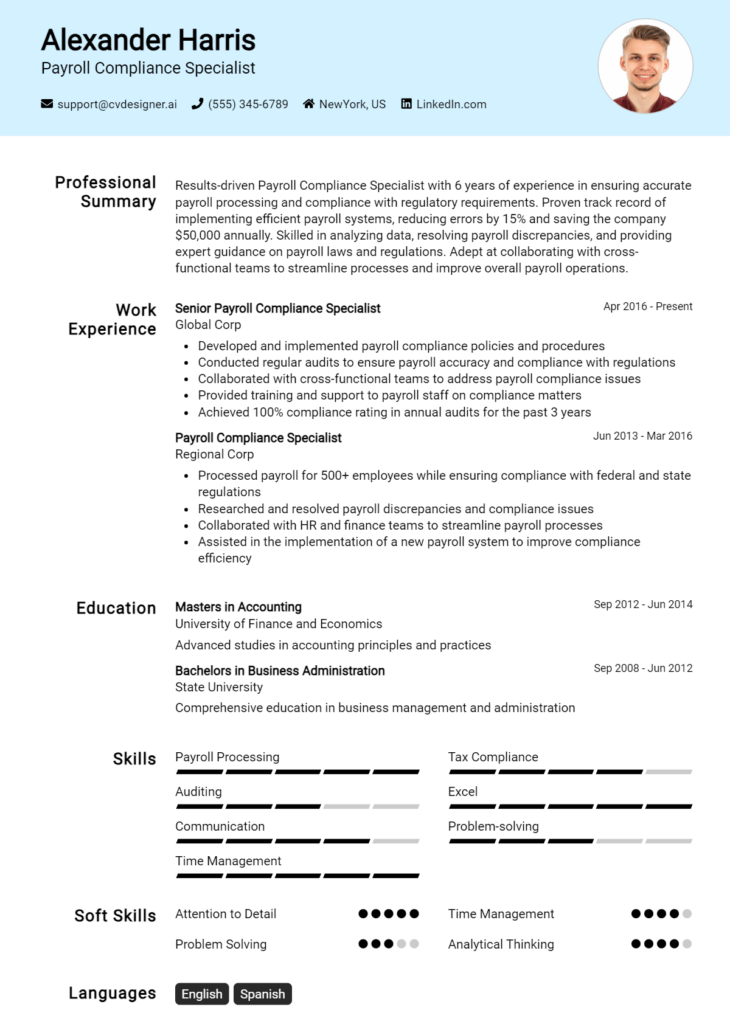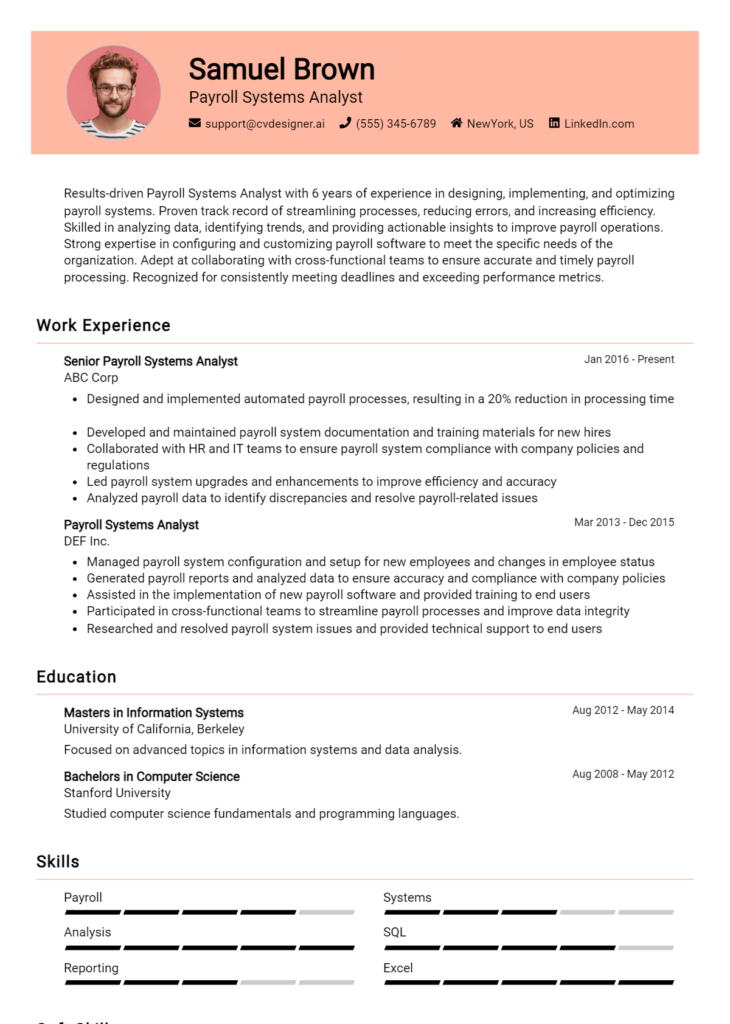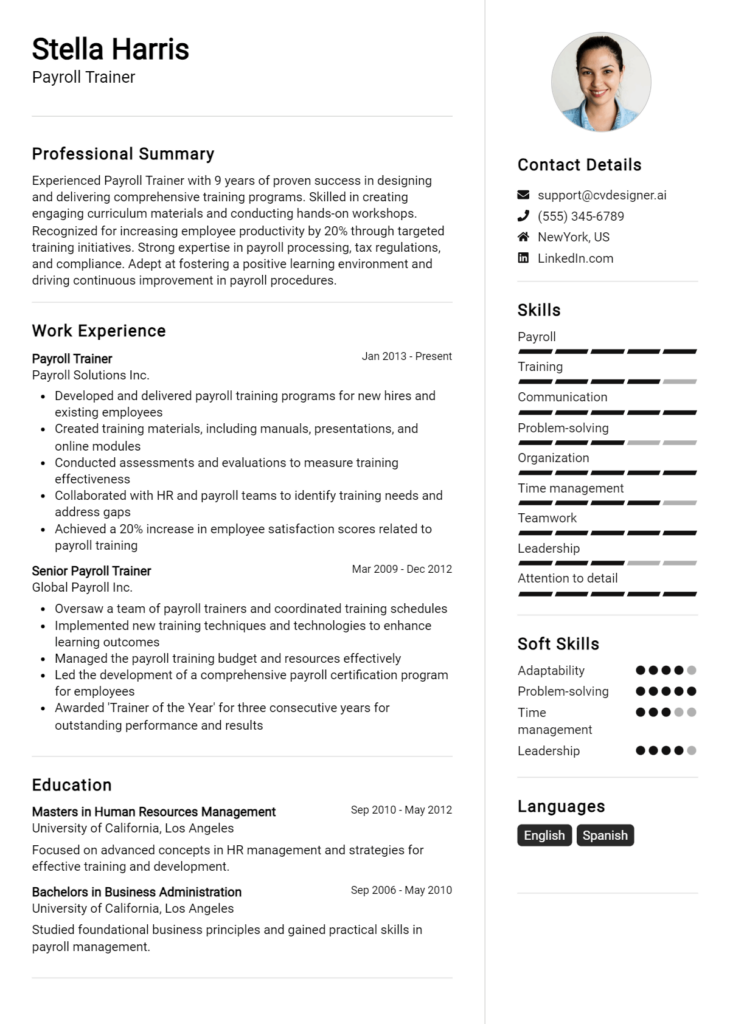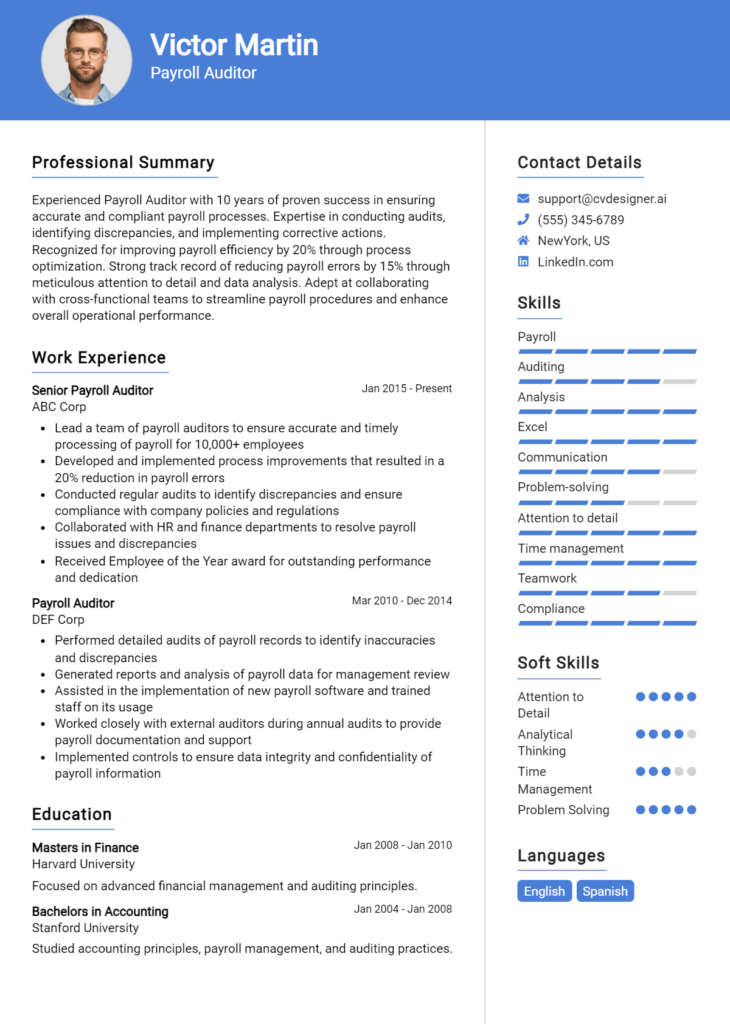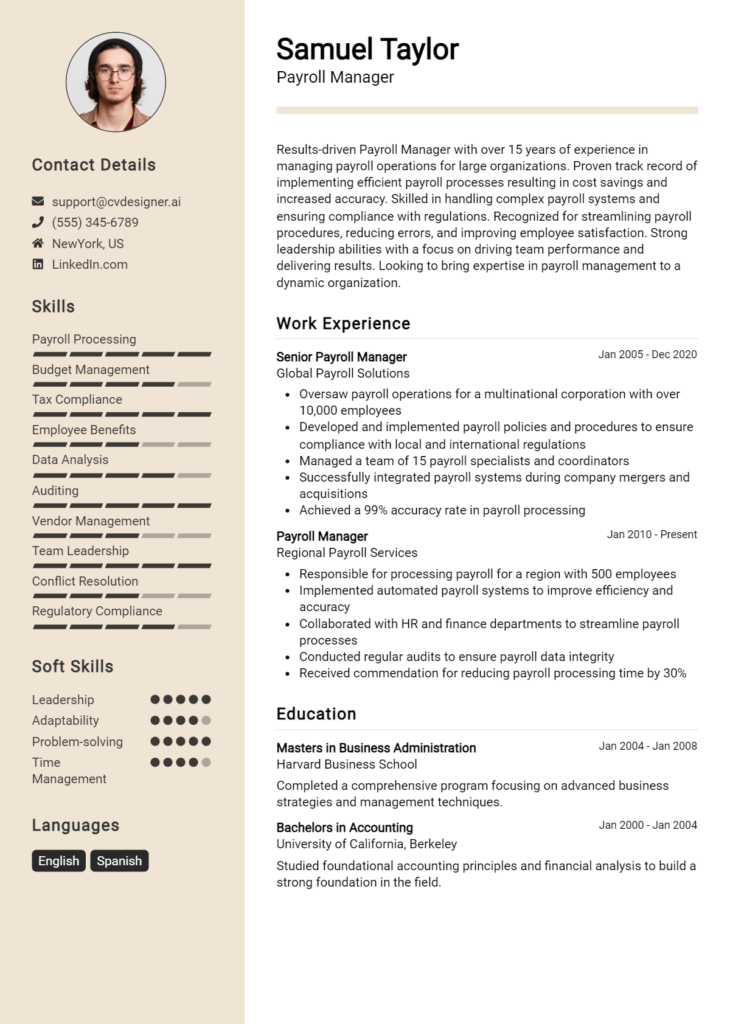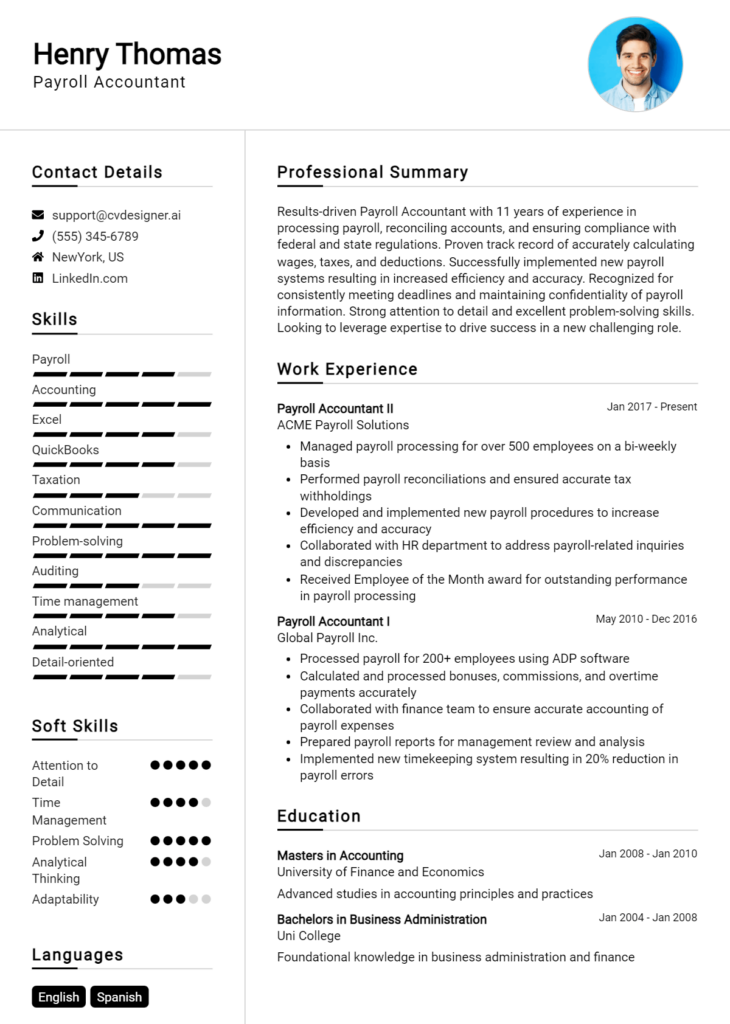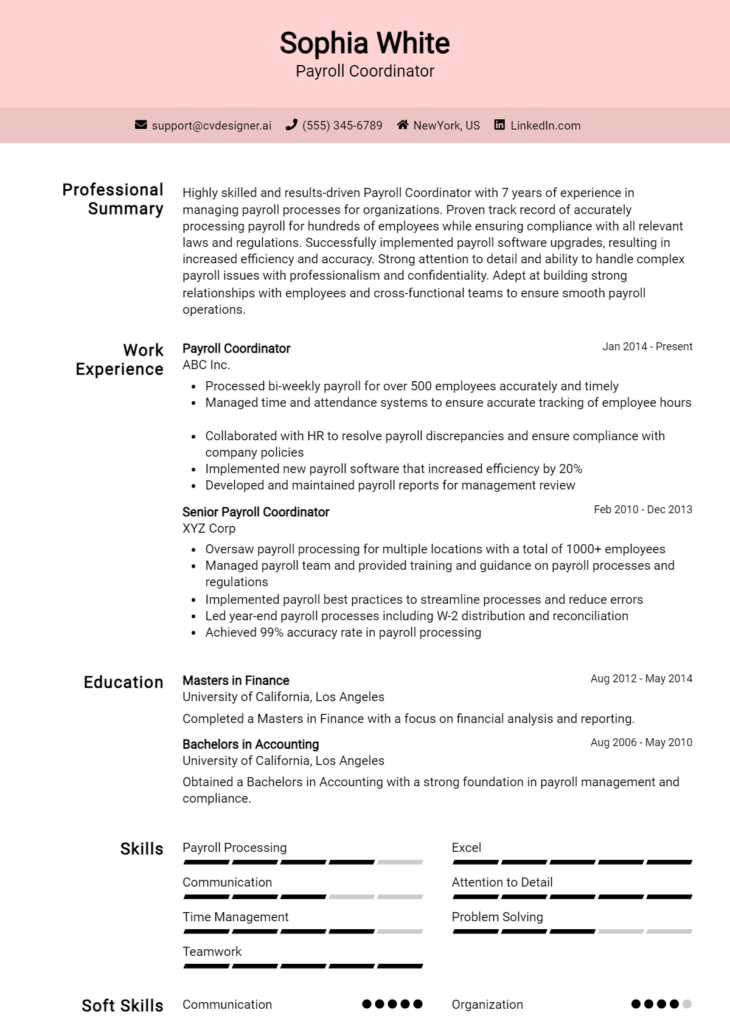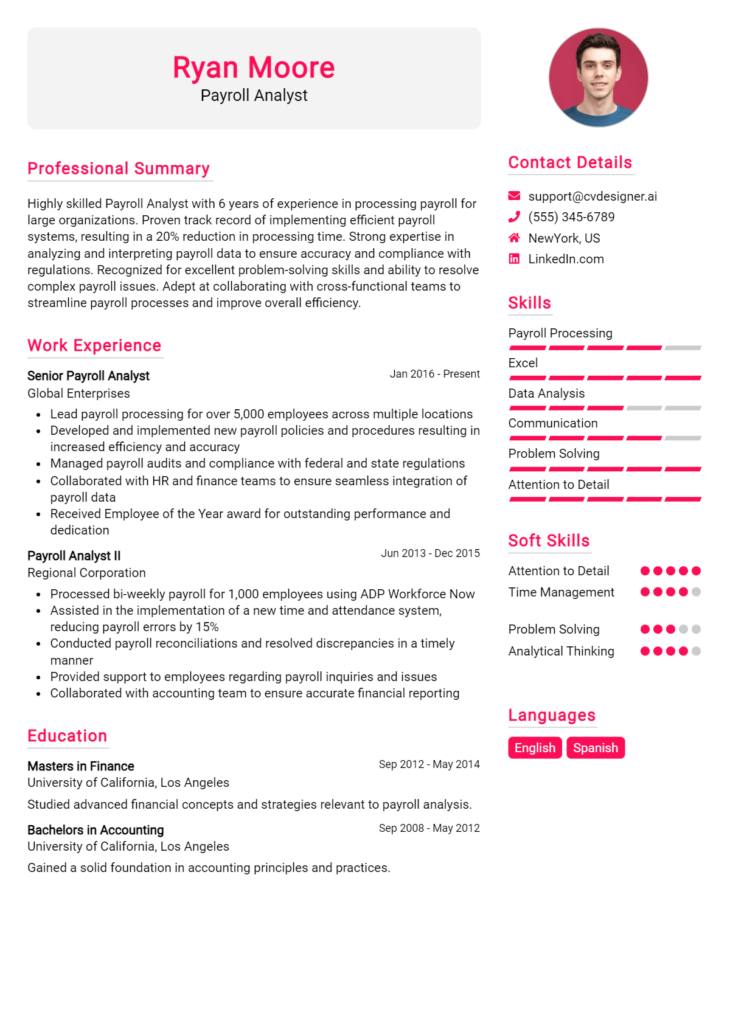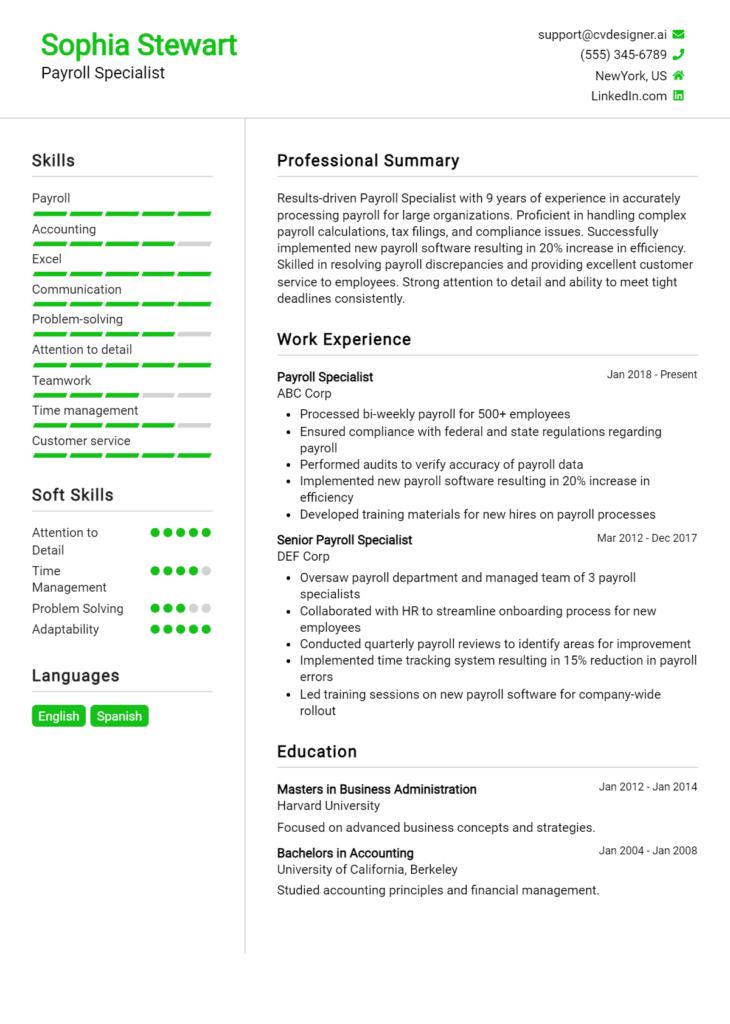Payroll Reporting Analyst Core Responsibilities
A Payroll Reporting Analyst plays a vital role in ensuring accurate payroll data management and reporting, bridging finance, HR, and compliance functions. Key responsibilities include analyzing payroll data, preparing detailed reports, and ensuring adherence to regulations. Successful candidates possess strong technical skills in payroll software and Excel, operational knowledge of payroll processes, and problem-solving abilities to address discrepancies. These competencies significantly contribute to organizational goals, and a well-structured resume can effectively highlight these qualifications, increasing the chances of securing a desired position.
Common Responsibilities Listed on Payroll Reporting Analyst Resume
- Analyze and interpret payroll data for accuracy and compliance.
- Prepare regular payroll reports for management and auditing purposes.
- Collaborate with HR to ensure accurate employee data management.
- Assist in developing and implementing payroll policies and procedures.
- Identify and resolve payroll discrepancies or issues.
- Monitor regulatory changes affecting payroll practices.
- Provide training and support to payroll staff on software and processes.
- Support year-end processes, including tax reporting and compliance.
- Ensure timely payroll processing and reporting deadlines are met.
- Utilize payroll software for data entry and report generation.
- Conduct audits and reconciliations of payroll records.
High-Level Resume Tips for Payroll Reporting Analyst Professionals
In the competitive landscape of finance and accounting, a well-crafted resume is crucial for Payroll Reporting Analyst professionals. This document serves as the first impression a candidate makes on potential employers, and it must effectively showcase both skills and achievements. A strong resume not only highlights relevant experience but also demonstrates the applicant's capability to contribute positively to the organization. In this guide, we will provide practical and actionable resume tips specifically tailored for Payroll Reporting Analyst professionals, ensuring that your application stands out from the crowd.
Top Resume Tips for Payroll Reporting Analyst Professionals
- Tailor your resume to match the job description by incorporating keywords that reflect the specific requirements and responsibilities of the role.
- Highlight relevant experience in payroll processing, reporting, and compliance to showcase your expertise in the field.
- Quantify your achievements by including metrics, such as the percentage of error reduction in payroll processing or improvements in reporting efficiency.
- Emphasize industry-specific skills, such as proficiency in payroll software (ADP, Paychex, etc.) and familiarity with tax regulations and labor laws.
- Include certifications or training relevant to payroll reporting, such as CPP (Certified Payroll Professional) or FPC (Fundamentals of Payroll Certification).
- Use clear and concise language to communicate your skills and experiences, making it easy for hiring managers to read and understand.
- Incorporate a professional summary at the beginning of your resume that highlights your key qualifications and career objectives.
- Make use of bullet points to list your responsibilities and accomplishments, ensuring that they are easy to scan and digest.
- Keep your resume format clean and professional, using consistent fonts and spacing to enhance readability.
- Proofread your resume multiple times to eliminate any grammatical or typographical errors, as attention to detail is critical in payroll reporting.
By implementing these tips, candidates can significantly increase their chances of landing a job in the Payroll Reporting Analyst field. A polished resume that effectively highlights relevant skills, accomplishments, and attention to detail will resonate with potential employers and set the stage for successful interviews.
Why Resume Headlines & Titles are Important for Payroll Reporting Analyst
In the competitive landscape of job applications, a well-crafted resume headline or title is crucial for a Payroll Reporting Analyst. This brief yet powerful statement serves as a first impression, instantly grabbing the attention of hiring managers and succinctly summarizing a candidate's key qualifications. A strong headline should be concise, relevant, and directly related to the job being applied for, providing clarity on the applicant's expertise in payroll reporting and analysis. By articulating their unique strengths in a single impactful phrase, candidates can significantly enhance their chances of being noticed in a crowded applicant pool.
Best Practices for Crafting Resume Headlines for Payroll Reporting Analyst
- Keep it concise: Aim for a headline that is no more than 10-15 words.
- Be role-specific: Use industry-related terms to specify the role of a Payroll Reporting Analyst.
- Highlight key skills: Incorporate essential skills relevant to payroll reporting, such as data analysis or compliance.
- Showcase experience: Mention years of experience or specific accomplishments that set you apart.
- Use action-oriented language: Start with strong verbs that convey initiative and expertise.
- Avoid jargon: Keep the language clear and accessible to ensure it resonates with all readers.
- Tailor for each application: Customize your headline to align with the specific job description.
- Focus on value: Emphasize how your skills can add value to the organization.
Example Resume Headlines for Payroll Reporting Analyst
Strong Resume Headlines
Experienced Payroll Reporting Analyst Specializing in Data Accuracy and Compliance
Detail-Oriented Payroll Analyst with 5+ Years in Financial Reporting
Results-Driven Payroll Reporting Specialist with Advanced Analytical Skills
Weak Resume Headlines
Payroll Analyst
Experienced Professional
The strong headlines are effective because they are specific, highlighting the candidate's experience and skill set while directly relating to the role of a Payroll Reporting Analyst. They provide immediate insight into what makes the candidate a fit for the position. In contrast, the weak headlines lack detail and specificity, failing to convey the candidate's unique qualifications or value proposition, which can lead to them being overlooked by hiring managers seeking qualified applicants.
Writing an Exceptional Payroll Reporting Analyst Resume Summary
A well-crafted resume summary is crucial for a Payroll Reporting Analyst as it serves as the first impression that hiring managers receive. In a competitive job market, a strong summary quickly captures attention by succinctly showcasing key skills, relevant experience, and notable accomplishments that align with the role. This brief section should be concise yet impactful, effectively highlighting the candidate's qualifications while being tailored to the specific job for which they are applying. A compelling summary can set the tone for the entire resume, making it essential for candidates to invest time in its creation.
Best Practices for Writing a Payroll Reporting Analyst Resume Summary
- Quantify Achievements: Use numbers and statistics to highlight your contributions, such as the percentage of payroll accuracy or cost savings achieved.
- Focus on Key Skills: Highlight relevant skills such as data analysis, reporting, and compliance with payroll regulations.
- Tailor the Summary: Customize your summary to reflect the specific requirements and keywords from the job description.
- Be Concise: Aim for 2-4 sentences that convey your strengths without unnecessary fluff.
- Showcase Relevant Experience: Mention specific experiences that directly relate to payroll reporting and analysis.
- Use Action Words: Start sentences with strong verbs to convey a sense of proactivity and achievement.
- Highlight Certifications: If applicable, include any relevant certifications that enhance your qualifications for the role.
- Maintain Professional Tone: Keep the language formal and professional to reflect the seriousness of the role.
Example Payroll Reporting Analyst Resume Summaries
Strong Resume Summaries
Detail-oriented Payroll Reporting Analyst with over 5 years of experience in streamlining payroll processes, achieving a 98% accuracy rate and reducing payroll processing time by 20%. Proficient in using ADP and SAP for payroll management, with a strong understanding of tax compliance and labor laws.
Results-driven Payroll Reporting Analyst with a proven track record of analyzing payroll data and generating comprehensive reports. Successfully implemented new reporting systems that improved data accuracy by 30% and reduced reporting time by 40%, ensuring timely compliance with regulations.
Analytical Payroll Reporting Analyst skilled in financial reporting and data interpretation. Led a project that integrated payroll systems, resulting in a 15% reduction in operational costs while enhancing reporting capabilities for management.
Weak Resume Summaries
Experienced payroll professional looking for a new opportunity. I have some experience with payroll software and enjoy working with numbers.
Payroll Reporting Analyst with background in payroll processing. I am a team player and can help the company with its payroll needs.
The examples provided illustrate the difference between strong and weak resume summaries effectively. Strong summaries stand out due to their use of quantifiable achievements, specific skills, and direct relevance to the Payroll Reporting Analyst role, making them compelling to hiring managers. In contrast, weak summaries are vague, lack measurable outcomes, and fail to convey genuine expertise or interest in the position, which diminishes their impact.
Work Experience Section for Payroll Reporting Analyst Resume
The work experience section of a Payroll Reporting Analyst resume is vital as it effectively showcases a candidate's technical skills and their ability to manage teams while delivering high-quality products. This section not only highlights the applicant's relevant experience in payroll reporting and analysis but also demonstrates their proficiency in using various software tools and methodologies. By quantifying achievements and aligning work history with industry standards, candidates can illustrate their impact on previous employers, making a compelling case for their suitability for the role.
Best Practices for Payroll Reporting Analyst Work Experience
- Use specific metrics to quantify achievements, such as percentage improvements in reporting accuracy or time saved in payroll processing.
- Highlight technical skills relevant to payroll systems and reporting tools, such as proficiency in Excel, SAP, or ADP.
- Emphasize leadership roles, including team management and project oversight, to showcase collaboration and interpersonal skills.
- Align descriptions of past roles with industry standards and best practices to demonstrate familiarity with current trends.
- Include examples of process improvements or innovations that resulted in enhanced efficiency or reduced costs.
- Utilize action verbs to convey a sense of initiative and responsibility in previous roles.
- Tailor the work experience section to reflect the specific requirements and responsibilities outlined in the job description.
- Incorporate feedback or recognition received from supervisors or peers to add credibility to your accomplishments.
Example Work Experiences for Payroll Reporting Analyst
Strong Experiences
- Led a team of 5 in implementing a new payroll system that reduced processing time by 30%, resulting in a savings of $50,000 annually.
- Developed and executed a comprehensive reporting strategy that improved payroll accuracy by 25%, significantly decreasing discrepancies.
- Collaborated with the finance department to integrate payroll data into financial reports, enhancing decision-making processes and ensuring compliance.
- Trained and mentored junior analysts, elevating the team's overall performance and increasing departmental efficiency by 20%.
Weak Experiences
- Worked on payroll reporting tasks with little detail about specific contributions or outcomes.
- Assisted in various projects without defining the role or impact on the overall results.
- Responsible for managing payroll without quantifying the scope or scale of responsibilities.
- Participated in team meetings and discussions without highlighting any personal achievements or contributions.
The strong experiences are considered effective because they provide clear, quantifiable outcomes and demonstrate a high level of technical leadership and collaboration. They highlight specific achievements that directly align with the role of a Payroll Reporting Analyst. Conversely, the weak experiences lack detail and measurable results, making it difficult to assess the candidate's contributions or impact in their previous roles. This absence of specificity undermines their overall effectiveness in showcasing relevant skills and accomplishments.
Education and Certifications Section for Payroll Reporting Analyst Resume
The education and certifications section of a Payroll Reporting Analyst resume is crucial for showcasing the candidate's academic foundation, industry-specific qualifications, and commitment to ongoing professional development. This section serves as a testament to the candidate's expertise in payroll systems, compliance regulations, and data analysis—key competencies in this role. By including relevant coursework, certifications, and specialized training, candidates can significantly enhance their credibility and demonstrate their alignment with the expectations of potential employers, making a compelling case for their suitability in the position.
Best Practices for Payroll Reporting Analyst Education and Certifications
- Include degrees that are directly related to finance, accounting, or human resources.
- Highlight relevant certifications such as Certified Payroll Professional (CPP) or Fundamental Payroll Certification (FPC).
- List coursework that pertains to payroll management, tax compliance, and data analysis.
- Emphasize any specialized training in payroll software or data reporting tools.
- Keep the information concise yet detailed enough to showcase qualifications effectively.
- Prioritize recent education and certifications to reflect current knowledge and skills.
- Use industry-recognized terms and acronyms to resonate with hiring managers.
- Be honest about qualifications and avoid exaggeration to maintain credibility.
Example Education and Certifications for Payroll Reporting Analyst
Strong Examples
- Bachelor of Science in Accounting, University of XYZ, 2020
- Certified Payroll Professional (CPP), American Payroll Association, 2021
- Relevant Coursework: Payroll Accounting, Taxation, and Financial Reporting
- Advanced Excel for Financial Analysis, Online Training Course, 2022
Weak Examples
- Associate Degree in General Studies, Community College, 2015
- Certification in Basic Computer Skills, 2018
- High School Diploma, 2010
- Outdated Certification in Manual Payroll Processing, 2016
The examples classified as strong are considered relevant and impactful because they align directly with the skills and knowledge required for a Payroll Reporting Analyst role. They showcase specific degrees and certifications that enhance the candidate's qualifications and demonstrate a commitment to professional growth. Conversely, the weak examples lack relevance to the position, either due to the general nature of the qualifications or their outdated status, making them less effective in conveying the candidate's suitability for the role.
Top Skills & Keywords for Payroll Reporting Analyst Resume
As a Payroll Reporting Analyst, possessing the right skills is crucial for effectively managing payroll data, ensuring compliance, and delivering accurate reports. A well-crafted resume that highlights both hard and soft skills can significantly enhance your chances of standing out in a competitive job market. Employers seek candidates who not only understand the technical aspects of payroll processing but also possess the interpersonal skills necessary for collaboration and communication within teams. By showcasing your skills prominently, you demonstrate your readiness to contribute to the organization’s payroll functions and overall success.
Top Hard & Soft Skills for Payroll Reporting Analyst
Soft Skills
- Attention to Detail
- Analytical Thinking
- Problem-Solving
- Communication Skills
- Time Management
- Adaptability
- Team Collaboration
- Critical Thinking
- Customer Service Orientation
- Conflict Resolution
Hard Skills
- Payroll Software Proficiency (e.g., ADP, Paychex)
- Data Analysis and Reporting
- Knowledge of Payroll Regulations and Compliance
- Advanced Excel Skills
- Financial Reporting
- Statistical Analysis
- Database Management
- Accounting Principles
- Tax Filing and Compliance
- Project Management
For a comprehensive understanding of how to effectively showcase your skills, consider exploring skills and ensuring your work experience aligns with the qualifications you present.
Stand Out with a Winning Payroll Reporting Analyst Cover Letter
I am writing to express my interest in the Payroll Reporting Analyst position at [Company Name], as advertised on [where you found the job posting]. With over [X years] of experience in payroll processing and reporting, paired with my strong analytical skills and attention to detail, I am confident in my ability to contribute effectively to your team. My comprehensive understanding of payroll systems, coupled with my ability to interpret complex data, aligns well with the requirements of this role.
In my previous position at [Previous Company Name], I successfully managed payroll reporting for a diverse workforce, ensuring accuracy and compliance with federal and state regulations. I developed streamlined processes that reduced reporting errors by [X%] and improved overall efficiency. My proficiency with payroll software and data analysis tools, such as [specific tools or software], allowed me to provide actionable insights that informed strategic decisions and improved payroll accuracy. I thrive in fast-paced environments and am adept at managing multiple tasks while adhering to strict deadlines.
Moreover, my collaborative approach has enabled me to work effectively with cross-functional teams, including HR and finance, to enhance payroll processes and resolve discrepancies. I believe that effective communication is key in this role, and I am dedicated to fostering a transparent dialogue with stakeholders to ensure all payroll-related concerns are addressed promptly. I am excited about the opportunity to bring my expertise in payroll reporting and analysis to [Company Name] and contribute to your commitment to excellence.
Thank you for considering my application. I am looking forward to the opportunity to discuss how my background, skills, and enthusiasms align with the needs of your team. I am eager to contribute to [Company Name] and help drive innovative payroll solutions that support your strategic objectives.
Common Mistakes to Avoid in a Payroll Reporting Analyst Resume
When crafting a resume as a Payroll Reporting Analyst, it's crucial to present your skills and experiences effectively. Many candidates make common mistakes that can hinder their chances of landing an interview. Understanding these pitfalls can help you create a more compelling resume that highlights your qualifications and catches the attention of hiring managers. Below are some common mistakes to avoid:
Ignoring Keywords: Failing to include relevant keywords from the job description can result in your resume getting filtered out by applicant tracking systems (ATS). Tailor your resume to match the specific skills and qualifications required for the role.
Vague Job Descriptions: Using generic descriptions for previous roles can make it hard for employers to gauge your specific contributions and accomplishments. Provide detailed examples that showcase your responsibilities and the impact you made.
Lack of Quantifiable Achievements: Not including numbers or metrics can make your accomplishments appear less impressive. Highlight specific achievements, such as reducing payroll processing time by a certain percentage or managing payroll for a specific number of employees.
Overcomplicating Technical Jargon: While it's important to demonstrate your technical skills, using too much jargon can confuse the reader. Clearly explain your skills and tools in a way that is understandable to someone who may not be familiar with them.
Neglecting Formatting: A cluttered or overly complicated resume layout can distract from your qualifications. Use a clean, professional format with clear headings and bullet points to make your resume easy to read.
Not Tailoring the Resume for Each Application: Sending the same resume for every job can signal a lack of interest in the specific position. Customize your resume for each application to reflect the most relevant experiences and skills.
Including Irrelevant Information: Adding unrelated work experiences or skills can dilute your resume's focus. Stick to information that directly relates to payroll reporting and your ability to perform in the role.
Skipping Proofreading: Typos and grammatical errors can create a negative impression of your attention to detail. Always proofread your resume or have someone else review it to ensure it's polished and professional.
Conclusion
In summary, the role of a Payroll Reporting Analyst is critical in ensuring accurate payroll processing, compliance with regulations, and delivering insightful financial reports. Key responsibilities include analyzing payroll data, preparing reports for management, and collaborating with HR and finance teams to maintain payroll accuracy. Additionally, the ability to use payroll software and generate reports efficiently is essential for success in this role.
As you reflect on your career as a Payroll Reporting Analyst, it's crucial to ensure your resume effectively showcases your skills and experiences. Take a moment to review your resume and consider how it aligns with the responsibilities and qualifications discussed.
To assist you in this process, explore the various resources available to enhance your resume. Utilize resume templates for a professional layout, or try out the resume builder for personalized guidance. Check out resume examples to gain inspiration from successful candidates, and don't forget to craft a compelling cover letter using our cover letter templates.
Take action today to ensure your resume stands out in the competitive job market!

